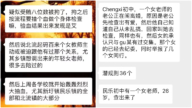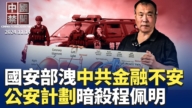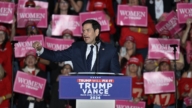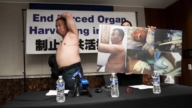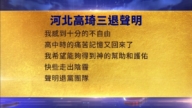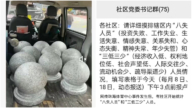【新唐人2013年02月04日讯】大陆国务院总理温家宝曾经多次在不同场合提到政治体制改革,但每次都难有下文。最近,即将卸任的温家宝在国务院会议上再次谈及政改,但大约10天之后,官媒才予以报导。这被外界视为中共对政改话题刻意淡化,体制内改革派力量越发处于弱势,而大陆民众也已经对病入膏肓的中共彻底绝望。
最新一期的中共中央核心刊物《求是》杂志,刊登了大陆国务院总理温家宝1月23号在国务院第八次全体会议上的讲话,但做了删节。
在讲话中,温家宝对近10年的国务院工作进行了总结,并且比较隐晦的再次提到政改。他谈到:提高治国理政能力,实现国家长治久安,是任何时代、任何国家的执政者都必须思考和解决好的重大课题。治理国家必须依靠民主和法治,归根结底就是必须有一套完善的体制、机制和制度。
温家宝说,权力过分集中又没有制约,是滋生腐败的根源。而“推进政府机构改革”是政治体制改革的重要内容。
温家宝这一涉及政改的讲话,在延迟大约10天后才被官媒报导。
旅美中国问题观察人士张健:“就是强烈的用这种方式来告诉体制内的人,温家宝讲话已经不算数了,他所讲的只代表他个人的想法、他的思路。也只代表他即将离任之前讲的一些官话、客套话。”
原《河北人民广播电台》编辑朱欣欣也认为,温家宝即将卸任,在党内的影响力越来越弱。当局登出这个涉及政改的讲话,只不过是用来安抚民心、装点门面而已。
原河北人民广播电台编辑朱欣欣:“(从)整个中共这个体制、上上下下官员们的表现来看,中共改革力量越来越弱。可以说,大部分民众、包括要求自由民主的知识份子,对中共失去了耐心和信心。”
在此之前,中共现任总书记习近平在接任中共最高领导人之后,也曾仿效邓小平到广东南巡,做出改革者姿态,并誓言大力反腐,要打“大老虎”,一时引来外界关注。
朱欣欣:“整个这个体制都变成一个腐败贪污的体制了,已经完全失去了自我的更新能力,完全是病入膏肓。习近平上台后实行的措施也是治标不治本。”
朱欣欣指出,如果习近平要治本,就必须彻底改革,这就会触动中共特权阶层,导致中共内部分裂。而如果不改革,外部的巨大民怨随时会引爆中国社会。
朱欣欣:“有句老话经常说:不改革亡国,改革亡党。我看国家永远亡不了,只能是共产党(亡)。它现在改也好,不改也好,早晚也是个亡。”
旅美中国问题观察人士张健也认为,中共高层不可能真正反腐,只是做样子给老百姓看。
张健:“从下到上,这个根已经全烂了,从根子上烂掉了。这个体制已经垮掉了。维持这个体制靠的就是国家机器、专政、一言堂,它依靠的就是这些东西。它怎么可能在这个节骨眼上,把中国所有的官员全部都抓掉呢。”
评论指出,虽然温家宝屡次高呼政改已被其他中共高层人士所默许,但是他们仍然会在事后采取相应办法减小温家宝讲话的影响。张健表示,当年温家宝继任国务院总理的时候,人们也曾经对所谓“胡温新政”充满期待。但这10年的社会现实是,贪官越来越多、集权越来越厉害、人民被盘剥的更加严重。
另据报导,2月1号上午,温家宝来到北京市西城区牛街西里二区走访,并召开座谈会。会上温家宝表白:自己工作做得不够好,感到愧疚自责,希望得到老百姓的原谅。
采访/刘惠 编辑/李谦 后制/周天
Wen Jiabao’s One More Political Reform Downplayed by the Party
Chinese Premier Wen Jiabao has repeatedly advocated
political reform, but then followed up with nothing.
Recently at a session of the State Council,
Wen once again spoke of political reform.
The official media didn’t publish the speech until 10 days later.
The action was seen as the Chinese Communists Party
deliberately down-playing political reform.
Observers think the CCP reformist forces have waned, while
the public in China have totally lost their confidence in the CCP.
The latest issue of Qiu Shi, CCP official magazine,
published Wen Jiabao’s speech given on January 23, the speech was shortened.
At the 8th State Council plenary, Wen Jiabao summarized
the State Council’s work over the past 10 years.
Again, Wen spoke indirectly of political reform.
He said that improving governance capability to realize
long-term state stability is a major task that
any ruler in any country and at any time
should ponder over and solve.
He stated that governance must rely on democracy and
rule of law, that is, a full-fledged system, mechanism and institutions.
Wen said that excessive and unchecked concentration
of political power is the root of corruption.
And so, “promoting reform of government agencies” is
an important part of political system reform.
Wen’s speech didn’t appear on the CCP’s official media
until 10 days later.
(Political observer) Zhang Jian: “In this way, it intentionally
told the CCP ruling elite that Wen Jiabao’s talk no longer works.
And that Wen’s speech is only his personal views and
some words of courtesy before he leaves office."
Zhu Xinxin, editor of former Hebei state radio, remarks that
the outgoing Wen Jiabao’s influence within the CCP has weakened.
The authorities used this speech as a window dressing
to appease the population, he says.
Zhu Xinxin: “The performance of the entire CCP system and
its officials show that the CCP’s energy for reform is waning.
At the moment, most of the populace, including pro-democracy
intellectuals, have lost patience and confidence in the CCP."
Prior to that, CCP new leader Xi Jinping did a southern tour
in Guangdong, the same trip taken by Deng Xiaoping in 1992.
Xi made a gesture of reform and vowed to assertively
fight against corrupt bigwigs, which drew the world’s attention.
Zhu Xinxin: “The entire CCP system is totally corrupt,
it has completely lost it’s self-renewal capacity. Xi’s initiatives are only palliatives.”
Zhu Xinxin indicates that a real cure is only achieved by
implementing a thorough reform.
But that will affect the CCP’s privileged elite,
and trigger the split up of the CCP.
And if it doesn’t carry out the reform, huge grievances
among the populace can explode at any time, Zhu Xinxin remarks.
Zhu Xinxin: “There’s an old saying: If it carries out the reform,
the CCP will perish; but if not, China itself will perish.
I believe the nation won’t die but the CCP will.
So regardless of what it’s dong now,
reform or no reform, it will end up dead.”
Zhang Jian says that the CCP top leadership won’t truly
combat corruption. It’s just a pose shown to the public.
Zhang Jian: “From bottom to top,
the CCP system has been rotten to the core.
Now the system is maintained by the operation of
state apparatus, and stifling free speech.
Clearly it cannot arrest all of its officials
at this moment “
Media commented that Wen Jiabao’s repeated political
reform proposals were acquiesced by other CCP top leaders.
But in various ways afterwards, they would still
lessen the impact of Wen’s talks.
Zhang Jian says that when Wen Jiabao became premier,
the public saw “the Hu-Wen administration” as a new hope.
Yet ten years later, China sees more corrupt officials,
more concentration of power, and more serious exploitation of the masses.
On February 1st, Wen Jiabao reportedly paid a visit to
a community in Xicheng district, Beijing and held a seminar.
At the seminar, Wen said he didn’t do a good job and felt guilty
about that. He was hoping to get the forgiveness of the masses.


